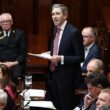THE GOVERNMENT has finally come out with more details about how its National Asset Management Agency (NAMA) is going to operate.
The proposed NAMA will buy, with government bonds, some 10,000 loans (half of which are behind in their payments and growing) and “assets” worth €90 billion off the banks at a “discount” (to be decided – but the figure of €20 billion is being bandied about).
By Michael O’Brien
The words “assets” and “discount” are put in quotes deliberately because much of what is being taken on includes land, offices and homes both here and abroad from which no profit is likely to ever be made. Not until 16 September will we know the method by which NAMA will value the “assets”.
One thing is for certain, NAMA will pay above the odds to the banks. Brian Lenihan has promised a price equivalent to what each asset would be worth if there wasn’t a recession.
Essentially, the taxpayer is responsible for the payment of these loans if and when the developers go bust. That’s a risk of around €70 billion on the taxpayer – the equivalent of twice the revenue the state will take in this year.
The government expects that the interest it gains from the loans that are performing will cover the losses from the bankruptcies and that the whole enterprise will result in a break-even situation after five years or so, when they claim the value of property will rise once again.
Morgan Kelly, professor of economics at UCD, believes that NAMA will bankrupt the country and that the idea that property prices will recover in the next few years is a “delusion”, saying “NAMA is in effect Fianna Fail’s shrine to the property bubble for which the party still yearns. Prepare to pay 10% more in income tax for the next 10 years to pay for it all…we are headed for national bankruptcy”.
You would think that so many houses and buildings falling into state hands would create an opportunity to solve housing lists, open community facilities and accommodate public services. But no, that would distort the normal operation of the capitalist market!
With NAMA and the bank bailouts, this government and their friends in construction and property want an eventual return to what they see as normality – which is the banks remaining in private hands and house building remaining a source of private profiteering.
The Socialist Party opposes NAMA. We don’t believe working people, their children and grandchildren should be burdened with debt just so it can be business as usual for the rich. The super rich should take their losses, the banks should be nationalised to ensure cheap credit for those who need it and working class people should be bailed out of their rip off mortgages.












